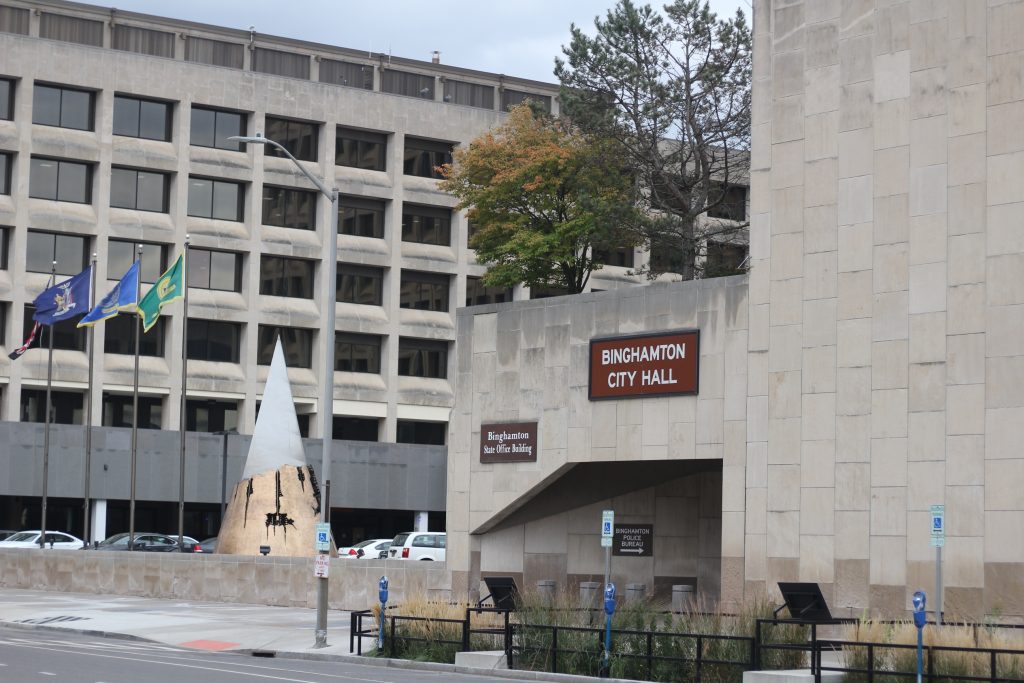The criminal trial of Hamail Waddell entered its second and final day on Thursday morning in Binghamton City Court. After Waddell took the witness stand in his defense, his attorney rested, and a verdict is expected at the end of the month.
Waddell, a Black-Asian man arrested on New Year’s Day in 2023, is charged with disorderly conduct and resisting arrest, both misdemeanors. After his apprehension last year, videos circulated quickly in the community depicting the arresting officer, Brad Kaczynski, kneeling on his back and neck.
Waddell testified to begin the proceedings, an unusual occurrence in criminal cases. He characterized himself as a peacemaker in response to questions from his attorney, Edward Kopko of Ithaca. After Kopko attempted to introduce a series of videos into evidence, the presiding judge, William Pelella, ordered a 10-minute recess so the district attorney, Paul Battisti, could view each one pending objection.
When the trial resumed, the defense’s videos faced scrutiny for foundation and authenticity concerns. The court then viewed each video, and Waddell gave testimony during specific portions.
The first, a three-minute excerpt of body camera footage, drew concerns from Battisti and Pelella because Waddell was not consistently shown throughout. The video was from a camera worn by Patrolman Matthew Zorovic, though it belonged to Patrolman Nicholas Delanoy and was switched between the two officers after being knocked off during the night.
Waddell testified that Kaczynski, who was a school resource officer at his high school, never told him he was under arrest and that police focused on him, ignoring white aggressors throughout the night. Kaczynski, Waddell said, slammed his head on the paddy wagon after apprehending him. The court accepted the first video into evidence.
The next several videos were captured by community members, raising questions surrounding their authenticity. Kopko argued that since body cameras were switched throughout the night, it was “basic fairness” to allow third-party video. Pelella accepted the two following videos into evidence, though the third, a slow-motion excerpt of a previous video, was rejected.
After viewing the next video, where Waddell can be heard screaming, “I can’t breathe,” a five-minute recess was ordered when he became emotional on the stand. The last video, an excerpt from Kaczynski’s body camera, was accepted into evidence without objection.
“These rogue police officers clearly singled out the black man, Waddell, for special treatment by grinding his face into the pavement and by kneeling on his neck,” Kopko told Pipe Dream.
Kopko said he planned to sue Kaczynski in civil court for depriving Waddell of his civil rights through the use of excessive force, a conclusion supported by a report from the state attorney general’s office released in early May. The city rejected the report’s factual findings and conclusions in August.
After Kopko’s question, Battisti, who reserved comment until after the verdict is delivered, was allowed the opportunity to cross-examine Waddell. He challenged Waddell’s self-characterization as a peacemaker, replaying a video introduced on Monday depicting him lunging at another individual.
Challenging his testimony further, Battisti replayed videos from that night, where Waddell could be heard saying he “threw a punch” and “took matters into his own hands.” Waddell said he “misspoke.” Battisti then asked if Waddell complied with law enforcement and if he respected the police, which Kopko objected to.
“I was violated,” Waddell said of Kaczynski’s treatment during an emotional exchange with Battisti.
After the defense rested, the evidentiary period was closed, and Kopko renewed his motion to dismiss.
“We have finally solved the mystery case,” Kopko said, arguing prosecutors had failed to prove their case beyond a reasonable doubt.
Pelella, once more, reserved a decision on the motion. Pelella and the two attorneys then conferenced before closing arguments, where Kopko spoke first.
Revisiting several points from his opening, Kopko alleged “ulterior racial motivations” underlaid police action, that “rowdy white thugs,” the true instigators of violence, were ignored. The police, he continued, colluded in a lie that Waddell’s injuries were self-inflicted, not because of Kaczynski’s “barbarous treatment.”
He said the absence of Kaczynski, who did not testify due to medical circumstances, left a “gaping hole” in the prosecution’s case.
Battisti’s closing built on his cross-examination of Waddell, who he characterized as a “violent aggressor.” This prosecution, Battisti said, was not based on “color, collusion or lies” but instead about defiance in a civilized society, and Waddell “refused to follow the lawful orders of the Binghamton Police Department.” Kaczynski’s state of mind, he added, was irrelevant, urging Pelella to find Waddell guilty.
The verdict will be delivered in Binghamton City Court on Oct. 29 at 2 p.m.



